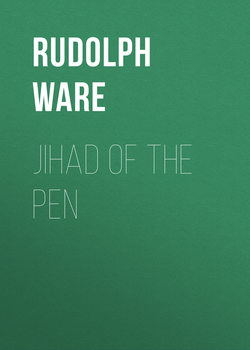Jihad of the Pen

Реклама. ООО «ЛитРес», ИНН: 7719571260.
Оглавление
Rudolph Ware. Jihad of the Pen
Table of Contents
Acknowledgments
Introduction. The Sufi Scholarship of Islamic West Africa. Zachary Wright
1. Introduction
2. The Roots of the Religion (Kitab usul al-din)
3. The Sciences of Behavior (‘Ulum al-mu‘amala)
4. The Book of Distinction (Kitab al-tafriqa)
5. Introduction
6 “A Reminder for the Seekers and Success for the Students” (Tadhkirat al-mustarshidin wa falah al-talibin)
7. The Lances of the Party of the Merciful against the Throats of the Party of the Accursed (al-Rimah hizb al-rahim ‘ala nuhur hizb al-rajim)
8. The Vessel of Happiness and Assistance for the Weak (Safinat al-sa‘ada li-ahl du‘f wa-l-najada)
9. Introduction
10 “The Valiant One” (al-Sindid)
11. Pathways of Paradise (Masalik al-Jinan)
12 “Gifts of the Benefactor in Praise of the Intercessor” (Mawahib al-nafi‘ fi mada’ih al-shafi‘)
13. Introduction
14 “The Spirit of Etiquette” (Ruh al-adab)
15. The Removal of Confusion (Kashif al-ilbas)
16 “The Jeweled Letters” (Jawahir al-rasa’il)
17. Poetry for the Prophet (from Dawawin al-sitt)
Conclusion. The Prophet, the Qur’an, and Islamic Ethics. Rudolph Ware
Notes
Bibliography
Отрывок из книги
Acknowledgments
Introduction: The Sufi Scholarship of Islamic West Africa
.....
The challenge in narrating the history of Islamic jurisprudence in Africa is to excavate those legal opinions that defined mainstream orthopraxy for centuries. For example, what were the legal opinions upon which the West African scholar mentioned above argued against Ibn Battuta’s assumption of gender norms in Islam? What were the legal methods by which al-Hajj Salim Suwaré, of the seminal Jakhanké clerical lineage, argued against the viability of jihad as a means of conversion to Islam?59 How did African jurists justify the ecumenical incorporation of diverse medicinal and esoteric methods for the treating of Muslim patients, or the use of the Qur’an to heal non-Muslims? What did it mean for scholars like Momar Mbacké or Muhammad Niasse to work “in the court” of Ma Ba Dioukhou during the nineteenth-century Senegambian Jihad? What were the legal grounds on which the children of these scholars (Ahmadu Bamba and ‘Abdallah Niasse) gave up that armed struggle? How did scholars conceive of executive authority in communities where a just imam or amir was absent?60 These questions, and others, are the stories of Islamic law in Africa that have only begun to be told by narrators with the requisite training to appreciate the complexities of Islamic legal discourse in Africa.
Questions of Islamic law were never absent in the foundation of West Africa’s largest Sufi communities. Dan Fodio’s daughter, Nana Asma’u, spread Islamic learning and Sufi practice among Hausa women as a replacement for Bori possession rituals, designated as legally impermissible by her father.61 ‘Umar Tal vehemently disagreed with Timbuktu scholars on the legality of tobacco smoking,62 perhaps meant to signify the ascendant purity of Tal’s community over the polluted, venal clerics of the past. Ahmadu Bamba relied on his training in Islamic law to argue against the Wolof King Lat Dior’s enslavement of fellow Muslims in battle,63 no doubt contributing to his appeal among constituencies marginalized by the perceived corruption of royal authorities. The otherwise friendly Senegalese Tijani scholars Malik Sy and ‘Abdallah Niasse had differing opinions of the legality of zakat collected from peanuts, the key cash crop that began to undergird the new Sufi communities as well as the colonial economy in Senegal.64 The prospect of Sufi realization no doubt attracted followers to these new communities, but the lives of West African Sufis were no less regulated by Islamic law than those of Muslim purist communities elsewhere.
.....